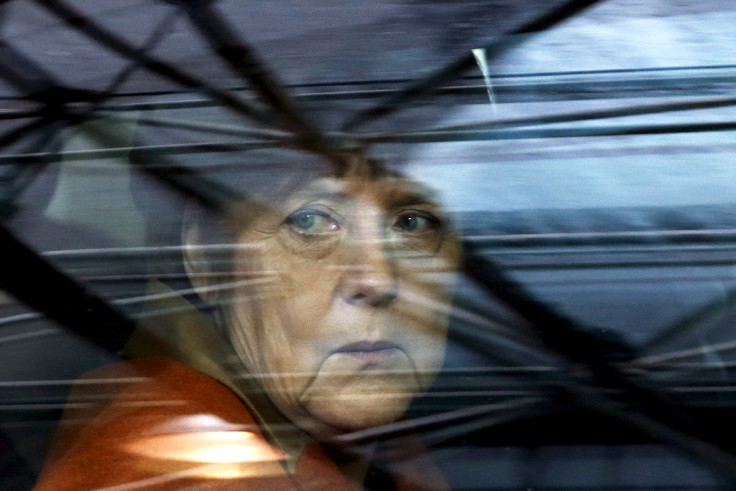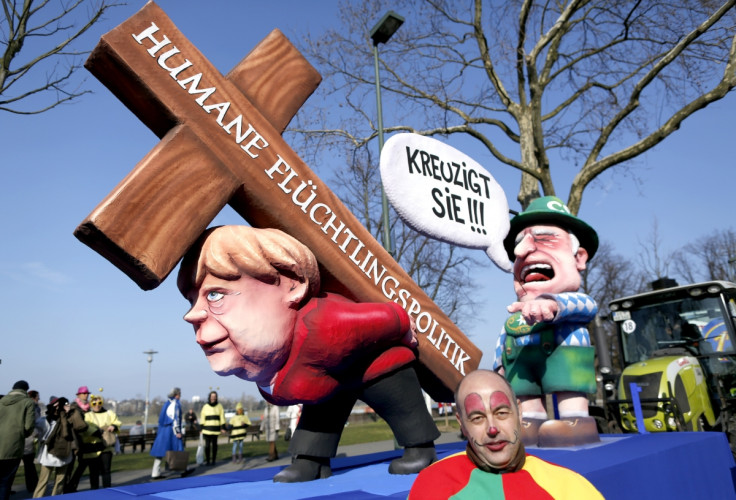Angela Merkel: Will Germany oust the Iron Chancellor over her 'open door' for refugees?

Much has been made of the losses that Angela Merkel's centre-right Christian Democratic Union (CDU) suffered at the hands of the anti-migrant Alternative for Germany (AfD) in local elections on 13 March; a poll billed as a referendum on the German chancellor's 'open door' policy on Syrian refugees.
The election results in Saxony-Anhalt, Baden-Württemberg and Rhineland-Palatinate were by no means positive for the chancellor. The AfD, the Green Party and the Social Democrats (SPD) all increased their share of the vote at the CDU's expense. But they were not so bad that, as some suggested, Merkel's position as leader was under threat. Indeed, two of the winners — the Greens and the SPD — back Merkel's refugees policy.
That said, the increase in support for the AfD, headed by 40-year-old former chemist Frauke Petry, shows a large number of Germans do not agree with Merkel's welcoming of thousands of Syrian refugees. In Saxony-Anhalt, a poor and traditionally conservative area of the country, they bagged 24% of the vote. All eyes are now on late 2017, when Germany will hold its next general election.
"The AfD is really damaging the CDU, even if they are very far from accessing power — I don't see them entering a coalition government at the national level any time soon — but they are setting the agenda in Germany," Adriano Bosoni, a senior Europe analyst for Stratfor, told IBTimes UK. "They will push Merkel to adopt elements from the nationalist agenda. As you will know in Britain with Ukip, you don't have to win an election to be influential."
Members of the CDU's sister party, the Christian Social Union (CSU), have also criticised Merkel. The CSU leader Horst Seehofer argued: "It cannot be that the answer to the people after such an election result is: everything goes on as before. This is a tectonic shift in the political landscape in Germany."
But analysts say rising support for the AfD is not as simple as a backlash against Merkel's stance on refugees. In her 10 years as CDU leader, she has brought the party firmly to the centre of German politics. On everything from immigration to nuclear power to the minimum wage, Merkel's progressiveness has been key to her popularity and success — but it also left many traditional conservatives feeling alienated.
"She is the moderniser," said Judy Dempsey, a non-resident senior associate at Carnegie Europe. "She is not a conservative by nature and she has moved the party over to the centre if not the left and a lot of conservatives don't like it [...] Those who supported AfD are not all radical hardliners who want to kick refugees out — the CDU under Merkel has not reached out to a section of the population who feel that conservatism has gone in a different direction."
Christian Schnee, a former spokesman for the CDU and now a senior lecturer at the University of Greenwich in London, told IBTimesUK that while there is anger towards Merkel over the refugee crisis, he expects it to subside as countries on the periphery of Europe - such as Macedonia - crack down on migrants crossing their borders.
"The discussions about refugee crisis, which had been so detrimental to the CDU leader's popular support, are bound to subside as numbers of new arrivals are dwindling. The Macedonian border guards will see to that," he said.

Merkel has served over a decade as chancellor and this is not the first time speculation has arisen about her future. But her dominance of the German political scene is such that there are few potential contenders even if she stands down in 2017. Finance Minister Wolfgang Schäuble is often touted as a successor but, at 73, few believe he has the energy or desire to take on the top job.
SPD leader Sigmar Gabriel is unpopular within a party already weakened by Merkel's traditionally left-wing stances on issues such as immigration, said Stratfor's Bosoni: "The SPD is having an identity crisis because Merkel was clever enough to take issues from the centre-left and adopt them as her own. [Now] they feel that they have to differentiate themselves from the CDU but they don't know how."
Germany used to defend founding principles of the EU such as the free movement of people, of labour the currency union, free trade — but like France it is moving to a mildly Eurosceptic position.
Even if public opinion turns against Merkel's policies on refugees, it is unlikely the chancellor will change course. On Monday, she promised to continue fighting for her Europe-wide response to the refugee crisis, even in the face of rising hostility from countries such as Austria and Hungary, and expectations of a new influx as weather conditions improve and Syria's war shows no sign of ending.
Merkel has proved both a popular leader and a champion of the European project in her time at the helm of Germany, but there are fears the tide of European opinion is going the other way. France and Germany are both seeing increasingly nationalist attitudes coming into the mainstream, particularly over refugees and the expectation that countries of northern Europe should financially bail out those of the south, such as Greece.
"Germany used to defend founding principles of the EU such as the free movement of people, of labour the currency union, free trade — but like France it is moving to a mildly Eurosceptic position," said Bosoni.
But equally, just as there looks to be no real contender to Merkel as leader of Germany, Europe without the Iron Chancellor would seem frighteningly rudderless. Whether it is her efforts to counter-balance the ever-boisterous Vladimir Putin, formulate a coherent policy over Ukraine, save Greece from meltdown or carve out a humane but practical response to the refugee crisis, Merkel appears invaluable to the European project.
"If she left, who would get a grip on Europe when it comes to dealing with Russia, the Ukraine crisis, the Minsk accord and the euro crisis? There no leaders out there. Everybody is saying: 'Oh, time to go Merkel' — but why should she go?" said Dempsey.
© Copyright IBTimes 2025. All rights reserved.





















